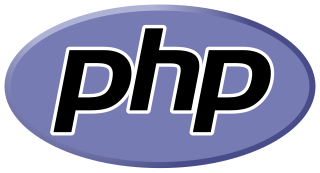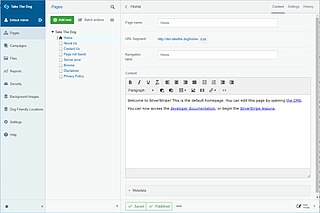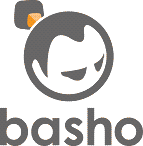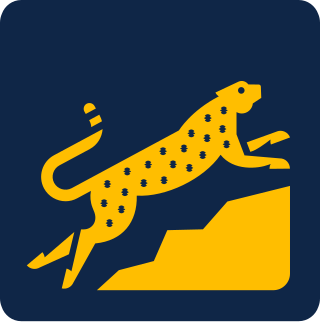
MySQL is an open-source relational database management system (RDBMS). Its name is a combination of "My", the name of co-founder Michael Widenius's daughter My, and "SQL", the acronym for Structured Query Language. A relational database organizes data into one or more data tables in which data may be related to each other; these relations help structure the data. SQL is a language that programmers use to create, modify and extract data from the relational database, as well as control user access to the database. In addition to relational databases and SQL, an RDBMS like MySQL works with an operating system to implement a relational database in a computer's storage system, manages users, allows for network access and facilitates testing database integrity and creation of backups.

PostgreSQL also known as Postgres, is a free and open-source relational database management system (RDBMS) emphasizing extensibility and SQL compliance. PostgreSQL features transactions with atomicity, consistency, isolation, durability (ACID) properties, automatically updatable views, materialized views, triggers, foreign keys, and stored procedures. It is supported on all major operating systems, including Windows, Linux, macOS, FreeBSD, and OpenBSD, and handles a range of workloads from single machines to data warehouses, data lakes, or web services with many concurrent users.

PHP is a general-purpose scripting language geared towards web development. It was originally created by Danish-Canadian programmer Rasmus Lerdorf in 1993 and released in 1995. The PHP reference implementation is now produced by the PHP Group. PHP was originally an abbreviation of Personal Home Page, but it now stands for the recursive acronym PHP: Hypertext Preprocessor.

Ingres Database is a proprietary SQL relational database management system intended to support large commercial and government applications.

Zend, formerly Zend Technologies, is a Minneapolis, Minnesota-based software company. The company's products, which include Zend Studio, assist software developers with developing, deploying, and managing PHP-based web applications.
In computing, a solution stack or software stack is a set of software subsystems or components needed to create a complete platform such that no additional software is needed to support applications. Applications are said to "run on" or "run on top of" the resulting platform.
The Open Source Developers' Conference (OSDC) was a non-profit conference for developers of open-source software. It was started in Australia in 2004, and later expanded to Israel, Taiwan, Malaysia, France and Norway, where conferences began in 2006, 2007, 2009, 2009 and 2015, respectively. No further conferences have been held since 2015.

Silverstripe CMS is a free and open source content management system (CMS) and framework for creating and maintaining websites and web applications. It provides an out of the box web-based administration panel that enables users to make modifications to parts of the website, which includes a WYSIWYG website editor. The core of the software is Silverstripe Framework, a PHP Web application framework.
CodeIgniter is a free and open-source software rapid development web framework, for use in building dynamic web sites with PHP.
An embedded database system is a database management system (DBMS) which is tightly integrated with an application software; it is embedded in the application. It is a broad technology category that includes:
Apache Empire-db is a Java library that provides a high level object-oriented API for accessing relational database management systems (RDBMS) through JDBC. Apache Empire-db is open source and provided under the Apache License 2.0 from the Apache Software Foundation.

MariaDB is a community-developed, commercially supported fork of the MySQL relational database management system (RDBMS), intended to remain free and open-source software under the GNU General Public License. Development is led by some of the original developers of MySQL, who forked it due to concerns over its acquisition by Oracle Corporation in 2009, but in 2024 MariaDB was itself bought by the K1 private equity group, which appointed a new CEO.

Basho Technologies was a distributed systems' company that developed a key-value NoSQL database technology, Riak, and an object storage system built upon the Riak platform, called Riak CS.
Jelastic is a cloud platform software vendor that provides multi-cloud platform as a service-based on container technology for hosting service providers, ISVs, telecommunication companies, enterprises and developers. The platform is available as public cloud in over 70 data centers, as well as virtual and on-premises servers. Jelastic provides support of Java, PHP, Ruby, Node.js, Python, Go environments, custom Docker containers and Kubernetes clusters.
Tcl is a high-level, general-purpose, interpreted, dynamic programming language. It was designed with the goal of being very simple but powerful. Tcl casts everything into the mold of a command, even programming constructs like variable assignment and procedure definition. Tcl supports multiple programming paradigms, including object-oriented, imperative, functional, and procedural styles.
The following outline is provided as an overview of and topical guide to MySQL:
Wes McKinney is an American software developer and businessman. He is the creator and "Benevolent Dictator for Life" (BDFL) of the open-source pandas package for data analysis in the Python programming language, and has also authored three versions of the reference book Python for Data Analysis. He's also the creator of Apache Arrow, a cross-language development platform for in-memory data, and Ibis, a unified Python dataframe API. He was the CEO and founder of technology startup Datapad. He was a software engineer at Two Sigma Investments. He founded Ursa Labs, which, in 2021, became part of Voltron Data. In 2022, it was announced that Voltron Data had raised $110 million.

RocksDB is a high performance embedded database for key-value data. It is a fork of Google's LevelDB optimized to exploit multi-core processors (CPUs), and make efficient use of fast storage, such as solid-state drives (SSD), for input/output (I/O) bound workloads. It is based on a log-structured merge-tree data structure. It is written in C++ and provides official language bindings for C++, C, and Java. Many third-party language bindings exist. RocksDB is free and open-source software, released originally under a BSD 3-clause license. However, in July 2017 the project was migrated to a dual license of both Apache 2.0 and GPLv2 license. This change helped its adoption in Apache Software Foundation's projects after blacklist of the previous BSD+Patents license clause.
Reynold Xin is a computer scientist and engineer specializing in big data, distributed systems, and cloud computing. He is a co-founder and Chief Architect of Databricks. He is best known for his work on Apache Spark, a leading open-source Big Data project. He was designer and lead developer of the GraphX, Project Tungsten, and Structured Streaming components and he co-designed DataFrames, all of which are part of the core Apache Spark distribution; he also served as the release manager for Spark's 2.0 release.

ClickHouse is an open-source column-oriented DBMS for online analytical processing (OLAP) that allows users to generate analytical reports using SQL queries in real-time. ClickHouse Inc. is headquartered in the San Francisco Bay Area with the subsidiary, ClickHouse B.V., based in Amsterdam, Netherlands.










